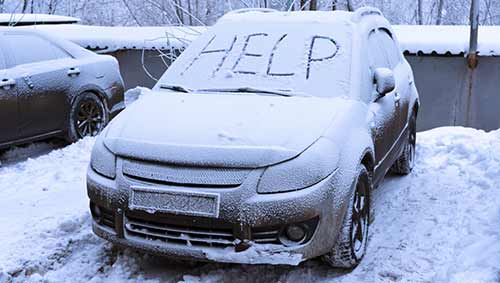

Some people like to add water to their windshield wiper fluid during the summertime. It saves money sometimes. Some will even just use water. But once winter hits, any windshield wiper fluid that’s diluted could freeze up on you. And that’s not good if you have salt covering your windshield and can’t see through it. Before winter hits, make sure you use undiluted windshield wiper fluid. And if you do try to quickly clean your windshield and realize it’s frozen, don’t keep trying. You could end up blowing a fuse and breaking your screen washer for good. It might be a good idea to have some glass cleaner in your car as well as a roll of paper towels. Should your screen washers freeze up and you’re having any trouble seeing, do your best to find a safe spot to stop (the side of the road, a driveway, a parking lot, etc.) and clean it off manually.
Before you get in your car, make sure your wipers aren’t frozen to your windshield. Make sure you can lift them. You need functioning wipers in case your windshield gets dirty. Putting your wipers on when they’re frozen can also end up blowing a fuse, which could cause even more problems with your car. Make sure they aren’t automated to start when you start your car in cold weather just in case they’re frozen.
Frozen engines are also a problem during the winter due to lack of proper usage of anti-freeze. Make sure you get your car checked up and use a mix of the correct type of anti-freeze for your car.
If you have a frozen water pump and you try to start your car, you could end up stripping the teeth off your car’s timing belt. This could lead to a seriously expensive repair job. This s another reason to have your car professionally checked before winter gets too cold.
It happens to the best of us. Your lock freezes up on you. Squirting WD40 in the lock may help. If your door seals are frozen, try smearing Vaseline or silicone polish on them.
A main cause of a frozen ignition lock is moisture inside the car. If you leave wet clothes in your car overnight, or track a lot of snow in it, the inside of your car will have moisture in the air. This moisture could end up freezing your ignition lock. So, try your best to keep your car dry inside during the winter time to prevent this from happening.
If you realize your window is frozen, do not keep pressing on the down or up button. This likely won’t unfreeze your car window at all. In fact, it’ll likely remove it from its track or damage the window motor – another expensive repair. If this happens, the best thing you can do is to start your car, let the interior heat up and wait until your car window unfreezes. You could also try sticking a thin, somewhat pliant credit card between the window and the strip (to which it’s probably frozen) to chip up the ice. But waiting is the best option.
According to TheAA, “If the driven wheels are on an icy road and can’t grip it’s possible that an automatic parking brake won’t release.” This is another car problem that comes along with cold weather.
It’s a good thing to regularly clean your car during the winter to remove corrosive road salt. But if you’re using a power hose, you could end up leaving residual water on parts of your car such as your drum brakes and handbrake cables. Driving around after a clean may help get rid of any residual water. It’s best to take care when cleaning your car. Don’t do it when temperatures are expected to hit freezing point.